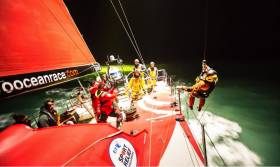Displaying items by tag: Hell on High Seas
Hell on High Seas VOR65 Team Raises £354,810 for Sport Relief
It's their final day on the open water, the Hell on High Seas team are on their way to London after skirting the Irish coast for the past 48 hours under former Irish Green Dragon Skipper Ian Walker, the current Volvo Ocean Race winner.The celebrity crew taking part in the BT Sport Relief Challenge: Hell on High Seas were forced to moor up for the night on Wedensday after the coastguard issued a Gale Force 10 Warning.
The yacht, crewed by The One Show’s Alex Jones, TV presenter Angellica Bell, Comedian Hal Cruttenden, Actress Doon Mackichan, and TV presenters Ore Oduba and Suzi Perry, was initially hoping to reach Southampton by the end of the day. However with members of the crew suffering extreme sea-sickness and the boat almost capsizing due to the towering waves, the team skipper Ian Walker took the decision to moor up for the night in Plymouth to let the storm pass.
In spite of the appalling conditions, the crew were overwhelmed when they heard they have raised a staggering £354,810 so far. This news means that they are more determined than ever to finish the challenge and make it across the finish line in London on Friday 11th March.
The incredible feat, which is sponsored by BT – a long-term supporter of Sport Relief challenges since 2009 – kicked off in Belfast on Monday 7th March after a weekend of intense training. The team are living, sleeping and working on the Volvo Ocean 65 - a carbon-fibre speed machine that has been optimized for maximum performance.
The money raised by the challenge will help transform the lives of some of the most disadvantaged people both at home in the UK and across some of the world’s poorest communities.






























































